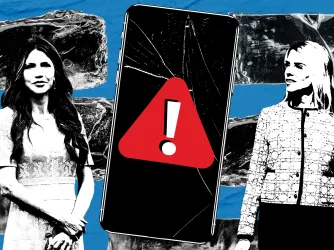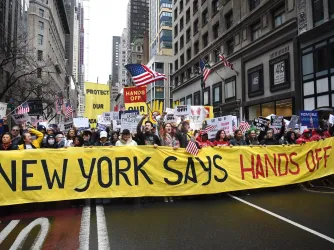Table of Contents
Virginia ACLU Petitions Supreme Court to Overturn Restrictions on Alcohol Advertising
The American Civil Liberties Union of Virginia has filed a petition asking the United States Supreme Court to review a recent decision by the Court of Appeals for the Fourth Circuit allowing for the restriction of alcohol-related advertisements in collegiate newspapers. The ACLU of Virginia, which filed the petition (.pdf) on Monday, is challenging the Fourth Circuit's decision (.pdf) in Educational Media Company at Virginia Tech v. Swecker on behalf of The Collegiate Times and The Cavalier Daily, student newspapers at Virginia Tech and the University of Virginia, respectively.
The Times and the Daily have challenged this regulation—instituted by Virginia's Alcoholic Beverage Control Board—successfully before. In 2008, a federal district court ruled that the ban was a violation of the papers' rights. This past April, however, the Fourth Circuit overturned the lower court's decision (in a three-judge panel, with one dissenter), citing a supposed link between reductions in alcohol-related advertising aimed in part at under-21 students and reduced underage binge drinking on college campuses. As the ACLU's press release puts it:
[T]he Fourth Circuit concluded that there was a "common sense" link between alcohol advertising bans in college papers and a decrease in demand for alcohol by college students, even if there was no evidence to support such an assumption.
This "common sense" conclusion was determined a worthy enough reason to abridge the editorial freedoms of the Times, Daily, and other college newspapers. Student Press Law Center (SPLC) Executive Director Frank LoMonte writes at SPLC's blog about the problematic nature of such a minimal evidence requirement:
[T]he Circuit's two-judge majority did not require the state to prove that restricting ads only in student publications actually produces any significant improvement in underage drinking and binge drinking, which is the rationale the state gave for singling out student media. There was no evidence that drinking on campus is any less problematic in Virginia than in comparable states without advertising restrictions, and the state could produce no studies or expert testimony documenting any cause-and-effect link.
Sounds pretty convincing, huh?
Currently, alcohol may be advertised in college newspapers only in the context of ads for dining establishments, though even that is restricted: restaurants are free to mention that they serve beer, but not to mention that you can get them for, say, two dollars a pint during happy hour. Worryingly, the Fourth Circuit held the damage to First Amendment interests caused by this restriction to be minimal, citing the relatively small circulations of most college newspapers and the sizable portion of readers who cannot legally purchase or consume alcohol. But First Amendment freedoms do not depend on circulation size, nor may freedom of the press be infringed upon because of the composition of a paper's audience—which is debatable anyhow. Again, Frank LoMonte pokes holes in this argument:
[T]he Circuit panel ignored the existence of alternative anti-alcohol-abuse measures - such as cautionary safe-drinking ads - that are proven to be more effective than an advertising ban, with no adverse First Amendment hangover. The majority judges concluded that the ban did little harm to First Amendment interests because it was "targeted" to publications read by those under 21, but (as the ACLU's petition argues) the evidence in fact showed otherwise. At least half of the readers of the Collegiate Times and Cavalier Daily are of legal drinking age, meaning that Virginia's restrictions are depriving thousands of readers of accurate information about a product that is legal for them to purchase.
What's more, the Fourth Circuit decision jeopardizes the finances of the ad revenue-dependent papers to the tune of thousands of dollars per year ($30,000 per year for the Times and Daily, according to the Washington Post), a reminder that the threats posed to the papers are not merely rhetorical.
The ACLU is challenging the Fourth Circuit's "common sense" rationale for its decision, and also pointing to the success of a similar suit brought in Pennsylvania—where the ACLU, on behalf of the University of Pittsburgh's Pitt News—successfully challenged a similar ban. In that case, the Third Circuit Court of Appeals' decision striking down the ban was authored by Samuel Alito, now of course an Associate Justice on the Supreme Court (and author of a stinging dissent in defense of free speech in Christian Legal Society v. Martinez).
The infantilization of college students resulting from this state law deserves to be challenged, and I hope the Supreme Court hears it. It's distressing to see this kind of discrimination against college newspapers sanctioned by courts simply because a portion of their readership isn't of legal drinking age. As Rebecca Glenberg, Legal Director of the ACLU of Virginia, pointed out, "College students are bombarded with alcohol ads everyday ... [t]here is no reason to believe that banning the small fraction of these ads that appear in college newspapers has any impact on student behavior."
In other words, an allegedly "common sense" link between someone's speech and someone else's behavior is not a good enough reason to roll back the First Amendment rights of college newspapers. I hope the Supreme Court will agree.
Recent Articles
Get the latest free speech news and analysis from FIRE.

FIRE sues Bondi, Noem for censoring Facebook group and app reporting ICE activity

Deep dive into New York’s proposals to ban demonstrations near houses of worship

Iran replaced my mother’s voice with silence
